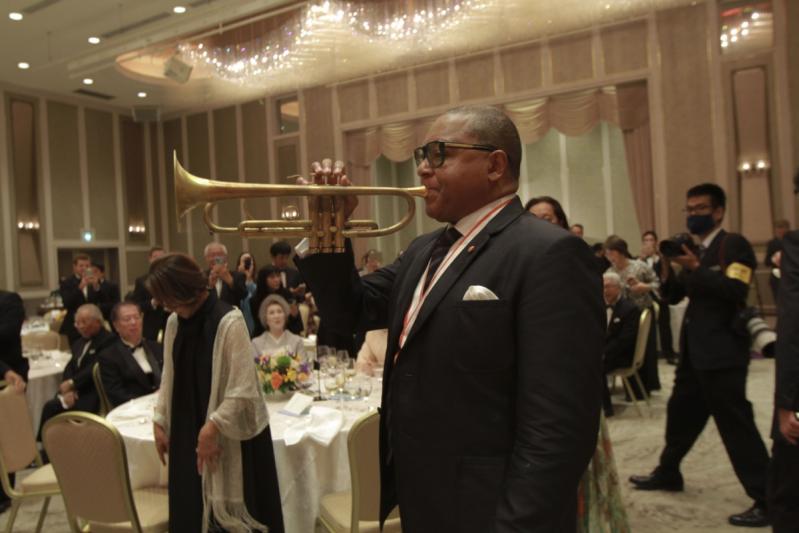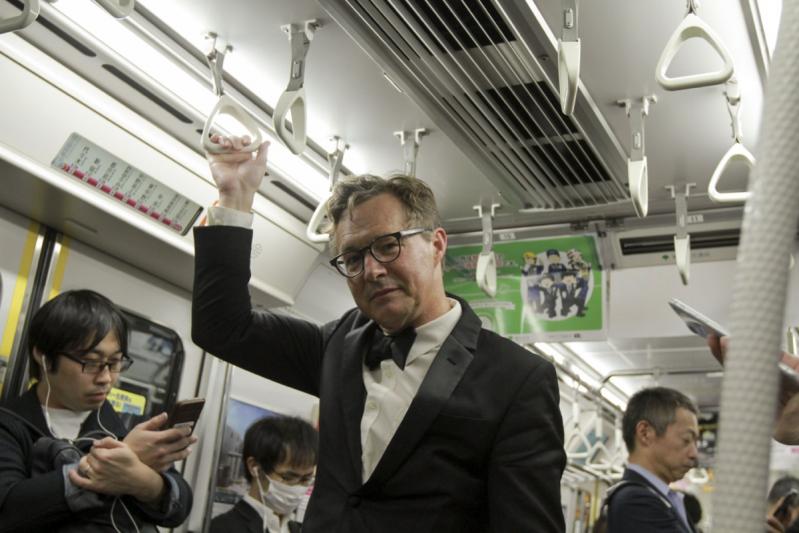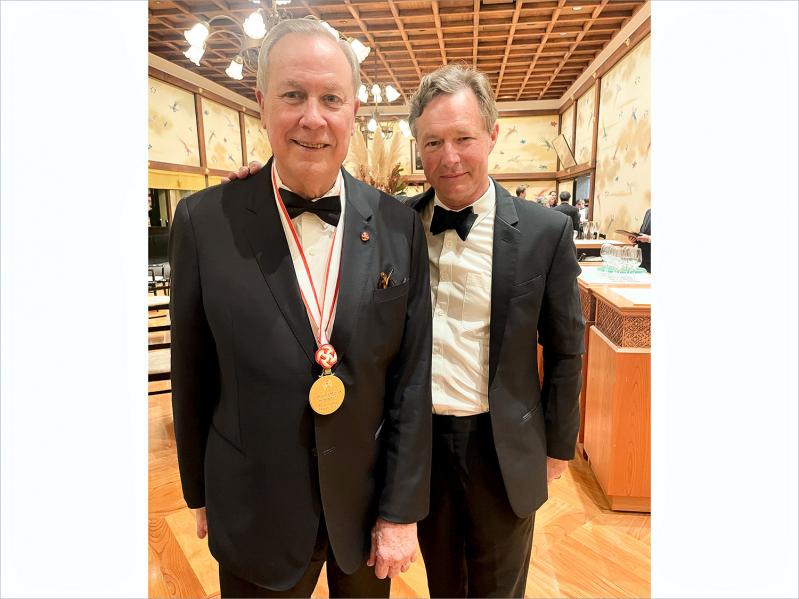On a Tuesday afternoon in October I landed at Tokyo's Haneda Airport, having left the previous morning from Los Angeles and, earlier still, that morning from New York, arriving with a very short time frame to celebrate a much longer one.
I was there to witness my mentor, friend, and inspiration Robert Wilson of the Watermill Center receive the Praemium Imperiale, often described as the Nobel Prize of the arts, from its royal patrons, Prince and Princess Hitachi. For his work in the theater he would be joining four other artists receiving their medals the next day at the Meiji Kinenkan reception hall, close by the Imperial Gardens.
Fitting for an ever-evolving relationship I've shared for 39 years with Bob -- to me and many others he is and will always be Bob -- getting to this moment first hand meant 18 hours of travel across 13 time zones.
As with other awards there was a nomination committee, and here with the Praemium Imperiale those persons were international and accomplished -- former prime ministers, a former president of the Goethe-Institut, the chancellor of Oxford, and New York's own former senator Hillary Rodham Clinton, who had attended the award's announcement in September at the White House.
Carrying two cameras, one loaded with old-school slide film, and a tiny yellow Mead notebook, I was ushered into a smaller reception room off the main lobby with a view out to gardens and sculpted pine trees. As I recognized how unrecognized I was, I was saved by Bob's agent, Christof Belka, himself a former assistant (yes, we've become like a club, but one in which I'm the only American in many years). He spotted me and brought his ebullient partner, Christian, over as the award recipients started to come in.
First there was Vija Celmins, the painter, clearly enjoying herself. Next, the sculptor Olafur Eliasson and the architect Diebedo Francis Kere, with his family, laughing and taking cellphone photos in rapid succession. Then the trumpet master Wynton Marsalis, joking and laughing, moving his hands to the shoulders of colleagues with gestures especially animated for having no horn to hold.

Each recipient had a clan, the Francis group and the Wynton group and the Bob group, watching as the artists posed for group shots and selfies. As if in a bee colony, all groups acknowledged the arrival of the nomination committee chairwoman, Mrs. Clinton, beaming in a beautiful red three-quarter-length patterned jacket. As she walked out to the wooden porch overlooking the garden, the selfie squads followed.
I remember meeting Bob before I actually met him. Sixteen and working at the old Bruce's restaurant on the town line in Sagaponack, I picked up a New York magazine in 1983 at the hostess station from which Bruce Weed's mother ruled our evenings. An article showed this tall, avant-garde theater director creating a new stage production, one I'd soon find myself a part of, called "the CIVIL warS."
Next to arresting minimalist images was a shot of Bob directing from the darkened theater seats, looking intense in a black turtleneck with horn-rimmed glasses and a crop of carefully combed dark hair. His background in Waco, Texas, was discussed alongside intimations of perfectionism and a singular visual approach, often wordless, staged in glacial time frames. Included were accounts of an international schedule booked for the next five years and an acknowledgement that his 1976 "Einstein on the Beach" had "changed the landscape of opera."
This inspired me, but in no way prepared me for what would happen within the year -- a deep-end leap into Bob's world. If he seemed older to me, he was then only 42, a trick of time. I'm now 15 years older than he was on the day we met all those years ago. When I'm around him, I'm not sure I feel any older than that day.
And then, in Japan, Bob joined us in the room, his gait and formal outfit all deeply familiar. Taking a seat at one of the small tables, his newest assistant, Liam, brought him a glass of wine. Bob watched, bemused, as iPhones flowed in space around the complete group of award recipients, smooth little rectangles pushed up against the digital cameras of press photographers wearing their identification armbands like in some period film.
Bob and I saw each other in a break from the greetings and said hello, just for a second. Because I also had cameras and intended to use them. It's unlikely I would know how to be at the event without one. A while back I gave up trying.
Upstairs, the ceremony was beginning. There's formal, and then there's Japanese formal, which this ceremony genuinely was, from its cadence to its details. After some introductions, our hostess, Princess Hitachi, entered, changing the energy in the room straight off. The audience rose and the majority bowed as she walked to her small table and wing-backed seat at center stage, passing a tremendous flower arrangement filled with the yellow and orange shades of autumn.
Her formal bearing and severe yet serene movements shared an onstage aesthetic that Bob is famous for. In fact, he has spoken to me many times about the enormous influence he feels from Japanese culture. Until the ceremony's conclusion, the princess didn't speak at all. In a pale gray furisode kimono with yellow floral accents across her left shoulder and a dark patterned obi around her waist, she walked with a masterpiece of a cane of deep-toned wood.
As the announcers spoke, her focus was straight ahead with no expression. But later, when Mrs. Clinton rose to address the room, I noticed the princess turn fully to face her, the wire of her translation device hanging from her left ear.
I grew up around artists and felt even as a kid the wake of legacy in the East End arts scene. Fellow students had well-known artist parents, and the holidays could include visits from Fairfield Porter's family or Darragh Park or Jane Freilicher. Elaine de Kooning was the adviser for my father, Casimir Rutkowski, when he was getting his master's degree at Pratt Institute. It would take years for me to appreciate the luck to be around it at all. But those were more traditional artists, whose lives seemed to be lived in contemplation of their inner energies, for solitary studio performance.
Bob Wilson was another animal, and his dynamic thinking about past and future, their conflation, and his energy in the present made a truly deep impression. Here was something both educated and wholly unknowable -- a deep reverence for techniques from every part of art-making and performance history alongside a commitment to reframe it all. And to do much of that in total or near silence at a pace seemingly borrowed from planetary orbits.
At the banquet next door after the ceremony, halfway through dinner, a security team moved into place around the hall and Prime Minister Fumio Kishida walked in briskly to address us. One of his team held a curious-looking briefcase. Former Prime Minister Shinzo Abe's assassination was uncomfortably recent, so they meant business and looked capable of quick suppression.
Mr. Kishida echoed a sentiment uttered by others that evening, that art and the artist hold out hope in a world of too much violence. Japan's prime minister seemed younger than his 66 years. I later learned he attended elementary school for some time in Elmhurst, Queens, and likes animated films. As he folded his black folio shut and handed it off to a guard, in perfect sync though neither looked at the other, our female announcer said in English, "And now the prime minister must depart to resume official duties."

Tell God your plans. I'd moved on years ago from the 24/7 working life of Bob Wilson, decades now from that inspired dynamo to what I thought was the relative simplicity of filmmaking, becoming a cinematographer. But as time has revealed, moving on is a failure. Bob's genius moves me still, internally and physically across the map, as a witness/participant in each next creation shared for so long and so well with his ever-evolving clan.
Bob spoke near the end of the ceremony, putting it beautifully: "What artists do is one of the few things that will remain in time," as with "the Greeks, the Romans, the Mayans, and the Native Americans, we see artifacts, the work of artists. When or if we go into the future thousands of years from now, we will be looking at the works of our contemporary artists."
Walking back to Roppongi Station, I thought about the way his voice broke while speaking, the vulnerable raw emotion on display. I called home to my wife, Betsy, trying to sum it up for myself as much as for her.
Richard Rutkowski, who lives in Manhattan and Water Mill, is a cinematographer for films and streaming series. His projects coming to Apple TV include "Masters of the Air," a World War II drama, and "Sugar," starring Colin Farrell as a Los Angeles private detective.




